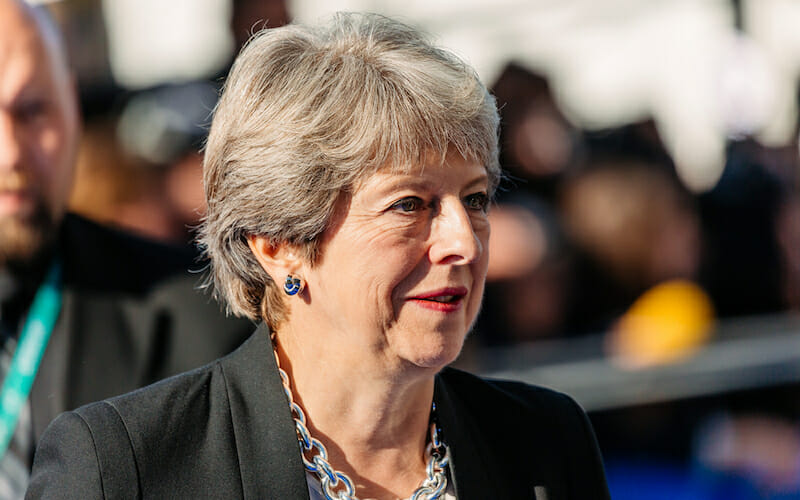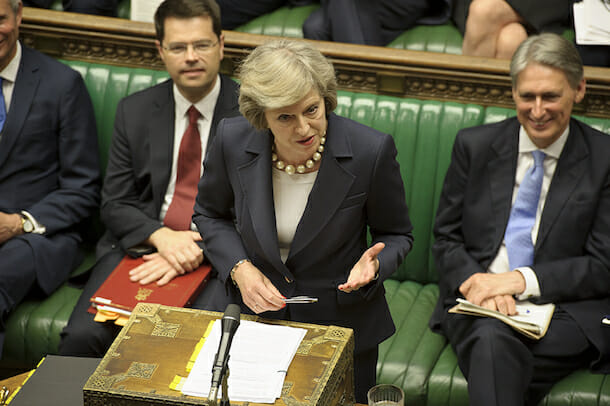
Theresa May Plays ‘Wag the Dog’
Theresa May is inventing a need for a new security relationship with the EU in order to divert attention from her failures to reach conclusive agreements on urgent issues.
Theresa May told a European security conference that Britain and the EU urgently need a new security arrangement. Practically the same speech appeared in a newspaper as a comment by her Home Secretary (Amber Rudd). The fakery doesn’t end with two people claiming to author the same text.
Like May, like Cameron
May is the second consecutive Conservative premier to fake the EU’s value to Britain’s security. Back in February 2016, David Cameron returned from Brussels to claim that he had made a deal for a “special status” for Britain in the EU, to the benefit of everything – including “national security.”
Cameron subsequently claimed that the EU helped Britain to counter Russian and Iranian threats, to counter the Ebola pandemic, and to replace war with dialogue.
Cameron’s government organized a letter to The Daily Telegraph arguing that Brexit would be bad for international security – apparently signed by 13 military personnel who had previously served the government, although one of them had never agreed to sign, and another was pressured to sign without seeing the letter. The letter offered no logic or evidence, only the airy assertions that “Britain will have to confront these challenges whether it is inside or outside the EU. But within the EU, we are stronger.” One of the signatories added that Brexit would break up NATO.
The Cameron government’s claims were so vacuous and tangential that they were forgotten in the subsequent four months of campaigning on the referendum to leave the EU.
Competing institutions
May has not learnt from Cameron’s failure. Her speech last week was equally vacuous, platitudinous, dishonest, and contradictory.
She claimed that “our security at home is best advanced through global cooperation, working with institutions that support that, including the EU.” That’s quite a sweeping endorsement of the EU, given the EU’s obstruction of other institutions.

Then her speech was downright contradictory: she promises that the EU would “reinvigorate the transatlantic relationship,” with “a reformed NATO alliance” and European-American commitment “to the collective security of this continent.”
Yet she gave no means to increase European-American cooperation; worse, she favours the EU to the disadvantage of NATO. May is promising that Britain and the EU should “be open to” further national contributions to EU military operations, EU defence research and development, EU international aid, the European Space Agency, the European Defence Fund, and the European Defence Agency.
May’s speech reveals her government’s willful avoidance of the incompatibilities between NATO and the EU. While NATO reinforced the Mediterranean against illegal migrations, the EU issued edicts on which countries should take the migrants. While NATO reinforces and organizes eastern European borders with Russia, the EU is expanding a transnational European military force in Western Europe. While NATO and national governments stand up to Russia’s many cyber and airspace incursions, and its harboring of suspects who travelled across Europe with plutonium to assassinate a dissident, the EU panders to an aggressor rather than upset its economic interests.
Anti-democratic
May’s speech also promises European-American cooperation in “advancing the democratic values on which our interests are founded.” That sounds childishly naïve. The EU prioritizes the EU’s central stability over democratization. Thus, the EU turns a blind eye to Eastern Europe’s descent into authoritarianism, and is accelerating Turkey’s prospective membership despite Turkey’s descent into authoritarianism, in return for half-hearted cooperation in managing the flow of migrants.
So far as the EU has helped NATO, it belatedly took over the monitoring of a region that NATO had stabilized and democratized already (the former Yugoslavia), but EU monitoring is corrupted by its agenda to expand the EU into the former Yugoslavia, which sometimes means turning a blind eye to bad actors, as long as they are pro-EU.
The EU is a cause of conflict between its undemocratic executive and democratically-minded member governments, between its undemocratic European courts and democratic national legislatures, and between unrepresentative members of the European parliament and national representatives.
Over-estimating EU provisions
May’s speech went on to praise herself as Home Secretary for “successfully” making “the case for the UK to opt” into certain provisions of “shared EU competence” in “justice and home affairs…that were clearly in our national interest.”
She specified the most vital “provision” as the European Arrest Warrant, which, she claimed, was “crucial” in countering terrorism in the island of Ireland. This is laughable fakery: British-Irish arrangements on transnational arrest and extradition predate the EAW. The EAW doesn’t guarantee anything, anywhere: compliance with foreign warrants depends on bilateral relations; the EU can’t enforce compliance.
May’s second example of a vital EU provision was EUROPOL, which is redundant to INTERPOL.
May’s third example was the Schengen Information System – an unintended reminder that the EU builds cross-border information sharing only after it destroys borders. In both EUROPOL and the Schengen Information System, Britain is the main contributor or second largest contributor of intelligence. What it gets back is frustration, such as leaks of intelligence and the distribution of arrest warrants that redact the faces and names of suspects because of privacy laws in certain member countries, including Germany.
In Denial
May’s speech admitted none of the ways in which the EU makes us less safe.
Indeed, her speech guaranteed all existing security arrangements with the EU, and added that “when participating in EU agencies the UK will respect the remit of the European Court of Justice.” That’s the same ECJ that interferes in British criminal justice and national security, and has revised British jurisprudence on immigration such that practically nobody can be denied entry and nobody can be deported, as long as they claim to be an EU citizen or a refugee – even if they lied, even if they’re criminals.
The EU is an economic and political union, which relegates security after its economic and political agendas. Theresa May is putting the EU’s agendas ahead of Britain’s security.

